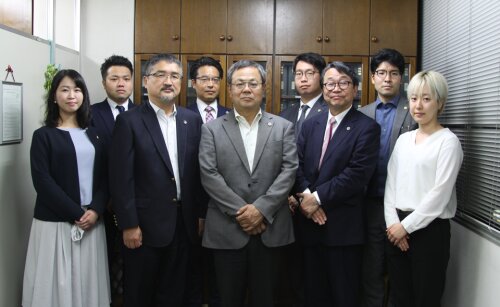Best Hiring & Firing Lawyers in Shizuoka
Share your needs with us, get contacted by law firms.
Free. Takes 2 min.
List of the best lawyers in Shizuoka, Japan
About Hiring & Firing Law in Shizuoka, Japan
Employment law in Shizuoka is governed primarily by national Japanese labor statutes, supplemented by prefectural and local administrative practices. Key national laws include the Labor Standards Act, the Labor Contract Act, the Industrial Safety and Health Act, and anti-discrimination rules such as the Equal Employment Opportunity Law. In practice, employers and employees in Shizuoka also rely on local institutions for guidance and dispute resolution, such as the Shizuoka Labor Bureau, local Labor Standards Inspection Offices, Hello Work employment offices, and community legal services. The central legal principle is protection of employee rights combined with the recognition of employer business needs. Dismissals and other termination measures are strictly regulated and can be overturned if found to be unreasonable or lacking good faith.
Why You May Need a Lawyer
Labor disputes can be legally complex and emotionally charged. You may need a labor lawyer in the following common situations:
- You face or are planning to issue a dismissal and want to ensure legal compliance and reduce litigation risk.
- You believe you have been unfairly dismissed and want to pursue reinstatement or compensation.
- An employer is withholding wages, refusing to pay overtime, or not providing statutory benefits.
- You need help negotiating a severance package, redundancy terms, or a settlement agreement.
- You are dealing with discrimination, harassment, or retaliation related to pregnancy, union activity, disability, age, or other protected status.
- Your workplace is subject to a collective dispute or you are negotiating with a union or employee representatives.
- You need assistance understanding or challenging fixed-term contract renewals and conversion rules.
- You want to draft, review, or amend employment contracts, workplace rules, or disciplinary policies to comply with law and best practices.
- You need representation in administrative proceedings with the Labor Standards Inspection Office, the Labor Relations Commission, mediation, or court.
A lawyer experienced in Japanese labor law can assess your facts, explain legal rights and risks, represent you in negotiations, handle procedural filings, and increase the chance of a favorable outcome.
Local Laws Overview
Key legal points especially relevant to hiring and firing in Shizuoka reflect national standards applied locally through relevant offices and courts:
- Notice and Payment in Lieu of Notice: Under the Labor Standards Act, employers must generally give 30 days notice before dismissal or pay 30 days average wages instead of notice. Immediate dismissal for serious misconduct is possible but must be justified.
- Unlawful or Unreasonable Dismissal: The Labor Contract Act prohibits dismissals that are objectively unreasonable and incompatible with good faith. Courts focus on whether dismissal was necessary, proportionate, and procedurally proper.
- Work Rules and Procedures: Companies with 10 or more employees must prepare written work rules covering employment conditions and submit them to the local Labor Standards Inspection Office. Work rules determine internal procedures for discipline and dismissal.
- Fixed-Term Contracts: Rules limit abusive use of successive fixed-term contracts. If employment under fixed-term contracts continues beyond a certain cumulative period, workers may assert conversion to an indefinite-term contract under statutory or judicial principles.
- Special Protections: Pregnant employees, those on childbirth or childcare leave, and employees engaged in union activities enjoy strong protection against dismissal. Dismissal during such protected periods is usually valid only with administrative approval or under very limited circumstances.
- Collective Dismissals and Mass Redundancies: Employers must engage in sincere consultation with worker representatives and take efforts to avoid dismissals such as reassignments or reduced hours. Failure to negotiate or show reasonable alternatives may render mass layoffs unlawful.
- Wage, Overtime, and Working Conditions: Employers must comply with statutory minimums for wages, limits on overtime and overtime premiums, and proper records. Violations can be reported to the Labor Standards Inspection Office.
- Harassment and Workplace Safety: Employers have a duty to prevent workplace harassment and ensure health and safety. Failure to act can create legal liability.
- Remedies and Procedures: Remedies include reinstatement orders, compensation for damages, payment of unpaid wages, administrative orders from labor authorities, and negotiated settlements. Dispute resolution options include consultation with labor bureaus, mediation, labor tribunals, and civil litigation.
Frequently Asked Questions
Can my employer dismiss me without cause?
No. While Japanese law does not require employers to state cause in the same way some jurisdictions do, dismissals must be objectively reasonable and conducted in good faith. Arbitrary or purely convenience-based dismissals are often found invalid by courts. Employers should have legitimate business or disciplinary reasons and follow fair procedures.
How much notice must an employer give before dismissal?
Employers generally must give 30 days notice before dismissal or pay 30 days average wages in lieu of notice, under the Labor Standards Act. There are limited exceptions for immediate dismissal for gross misconduct, but such cases are scrutinized closely.
Am I entitled to severance pay?
There is no general statutory obligation to pay severance in Japan. Whether you receive severance depends on your employment contract, company policy, collective agreements, or negotiated settlements. However, employers often offer severance in practice to reduce legal risk or as part of restructuring negotiations.
What should I do if I suspect an unfair dismissal?
Preserve all documentation - employment contract, work rules, pay slips, emails, dismissal notice, performance reviews, and any communications related to the dismissal. Seek early legal advice to evaluate options such as requesting internal review, filing a complaint with labor authorities, seeking mediation, or bringing a lawsuit for reinstatement or damages.
Can I be dismissed while on maternity leave or childcare leave?
Dismissal of an employee due to pregnancy, childbirth, maternity leave, or childcare leave is strictly limited and generally prohibited. Employers need strong, unrelated grounds and administrative approval in some cases. If you believe your dismissal was related to pregnancy or childcare, consult a lawyer promptly.
How are fixed-term contracts treated?
Fixed-term contracts are permitted, but the law and courts guard against abuse of repeated renewals to avoid stable employment obligations. Where a series of fixed-term renewals leads to de facto continuous employment, workers may claim conversion to an indefinite-term contract. Check specific terms and the total duration of your contracts.
What steps should an employer take before conducting a mass layoff?
Employers should engage in sincere consultation with employee representatives or unions, provide advance notice and information, explore alternatives such as reassignment or reduced hours, and offer reasonable severance or reemployment support. Failure to consult or consider alternatives may render mass dismissal unlawful.
Who can I contact about unpaid wages or overtime?
Unpaid wages and unpaid overtime are violations of the Labor Standards Act. You can file a complaint with the local Labor Standards Inspection Office, seek assistance from Hello Work, or consult a labor lawyer to pursue claims in court. Keep accurate records of hours worked and wage statements.
Are there protections against workplace harassment or bullying?
Yes. Employers have a duty to prevent and address workplace harassment, including sexual harassment and power harassment. Victims can seek remedies through internal procedures, complaints to labor authorities, civil actions for damages, and criminal reporting where applicable. Employers should have clear policies and take prompt corrective action.
What are my options if negotiations fail with my employer?
If internal negotiations fail, options include filing a complaint with local labor authorities, requesting mediation through administrative mediation services, filing a civil lawsuit for reinstatement or damages, or bringing specific claims with the Labor Relations Commission for union-related disputes. A lawyer can help choose the most appropriate forum and strategy.
Additional Resources
Use these local and national resources to get guidance, make complaints, or find legal help in Shizuoka:
- Shizuoka Labor Bureau and local Labor Standards Inspection Offices for complaints on wage, hours, and safety violations.
- Hello Work offices in Shizuoka for unemployment insurance, job placement, and employment counseling.
- Shizuoka Prefectural Government labor-related departments for local policies and assistance.
- Japan Ministry of Health, Labour and Welfare for national labor law information and public guidance.
- Japan Legal Support Center - Houterasu - for information about legal aid and finding subsidized counsel.
- Shizuoka Bar Association for referrals to lawyers specialized in labor and employment law.
- Local trade unions and worker advice centers for collective support and representation.
- Labor consultation desks at municipal offices and community legal consultation services for initial advice.
Next Steps
If you need legal assistance related to hiring or firing in Shizuoka, follow these practical steps:
- Document everything: Collect employment contracts, work rules, payslips, attendance records, performance reviews, notices, emails, and any other materials that show what happened and when.
- Take written notes: Record dates, names, locations, and details of meetings, disciplinary actions, or communications that are relevant to the dispute.
- Seek immediate advice: Contact a labor law attorney or use free/low-cost consultation channels such as municipal legal advice sessions, the Shizuoka Bar Association referral service, or Houterasu. Early advice can preserve evidence and legal options.
- Consider administrative routes: For wage or safety violations, file with the Labor Standards Inspection Office. For disputes related to collective bargaining or union rights, contact the Labor Relations Commission or local labor bureau.
- Prepare for negotiation: If you are an employee considering a settlement, know your priorities - reinstatement, compensation, confidentiality, or references - and let your lawyer negotiate terms that protect your interests.
- Evaluate litigation risks and timing: Labor litigation can take months. Discuss likelihood of success, costs, and alternative dispute resolution options with your lawyer.
- Protect your immediate needs: If you are unemployed, register with Hello Work to apply for unemployment benefits and support while disputes continue.
Getting the right legal help early can improve outcomes and reduce stress. Choose a lawyer experienced in Japanese labor law and familiar with local practice in Shizuoka to guide you through negotiation, administrative processes, or litigation.
Lawzana helps you find the best lawyers and law firms in Shizuoka through a curated and pre-screened list of qualified legal professionals. Our platform offers rankings and detailed profiles of attorneys and law firms, allowing you to compare based on practice areas, including Hiring & Firing, experience, and client feedback.
Each profile includes a description of the firm's areas of practice, client reviews, team members and partners, year of establishment, spoken languages, office locations, contact information, social media presence, and any published articles or resources. Most firms on our platform speak English and are experienced in both local and international legal matters.
Get a quote from top-rated law firms in Shizuoka, Japan — quickly, securely, and without unnecessary hassle.
Disclaimer:
The information provided on this page is for general informational purposes only and does not constitute legal advice. While we strive to ensure the accuracy and relevance of the content, legal information may change over time, and interpretations of the law can vary. You should always consult with a qualified legal professional for advice specific to your situation.
We disclaim all liability for actions taken or not taken based on the content of this page. If you believe any information is incorrect or outdated, please contact us, and we will review and update it where appropriate.










